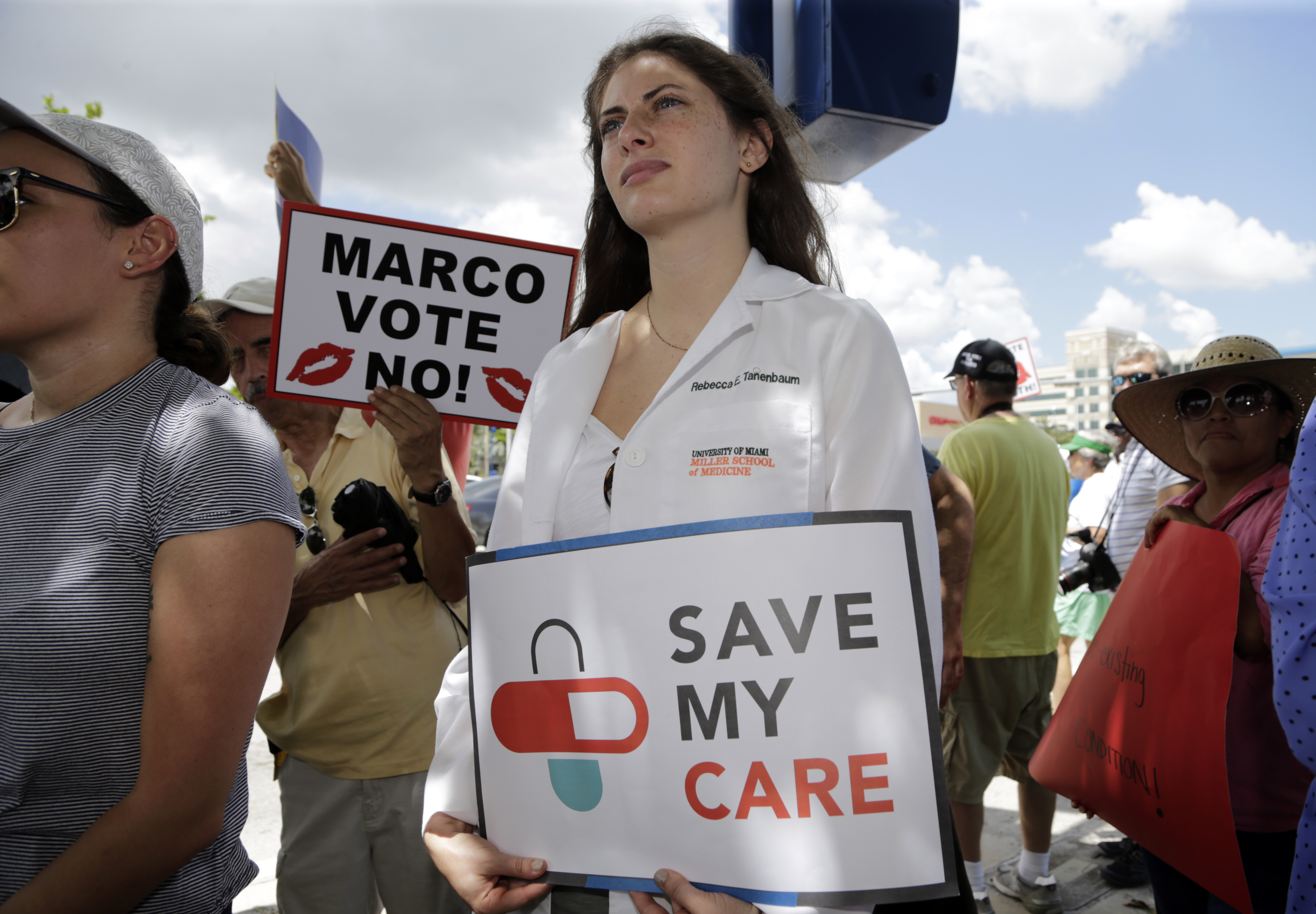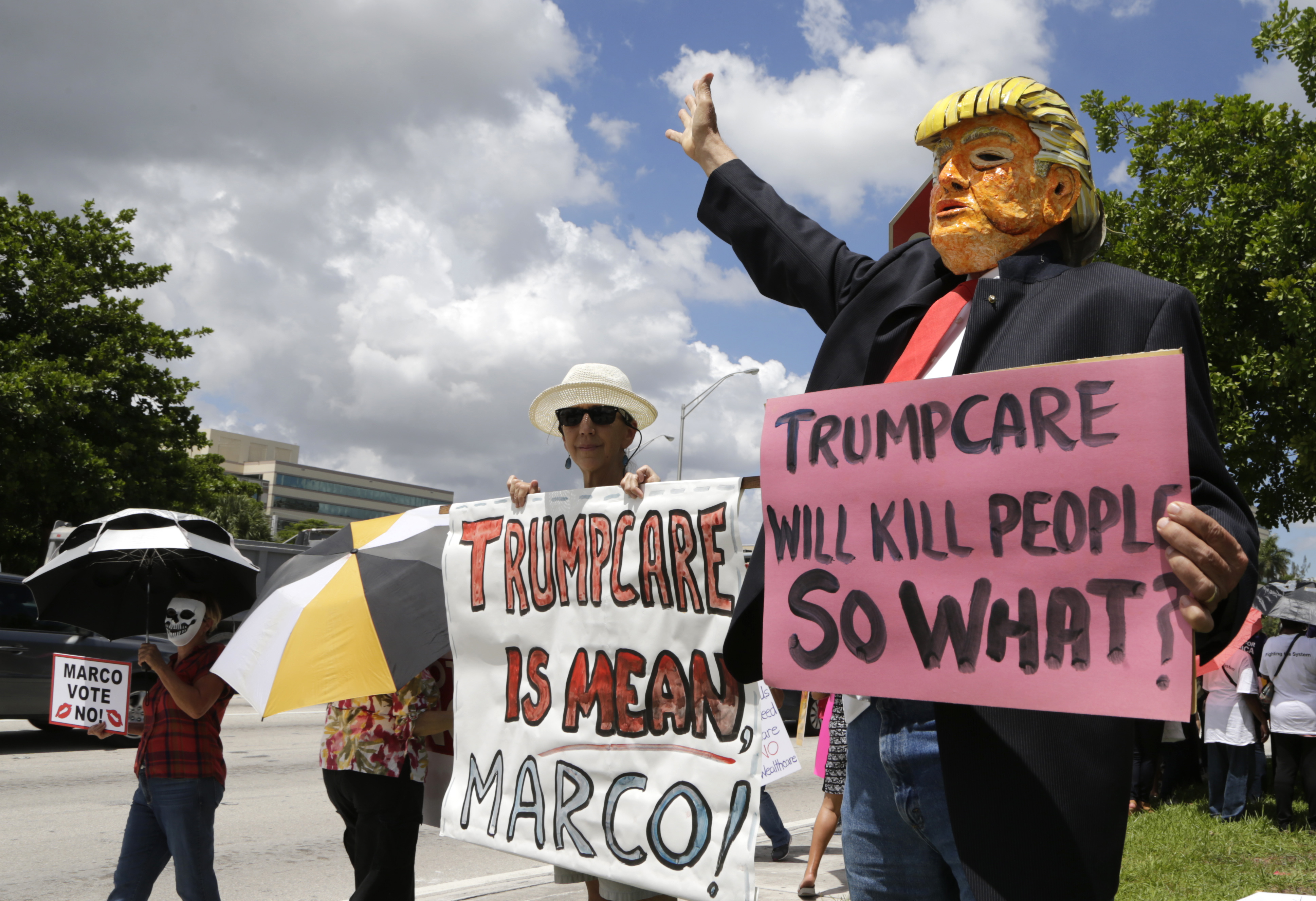Alex spends his days explaining how health insurance works to people in Florida. People who are enrolled in private plans on the Affordable Care Act (ACA) marketplace call a 1-800 number, and he’s there to answer any questions they may have about premium tax credits, coinsurance, and things of that sort. He’s a licensed navigator for the Community Health Interventions & Sickle Cell Agency Inc., which receives a federal grant for its efforts. And this time last month, he was temporarily laid off because of a lack of federal funding.
“We were let go from September 5th and were able to come back September 13th,” said Alex, who did not want to give his last name. “And that’s including everyone from our director to the navigator agents.”
Staff was laid off for five days because the Department of Health and Human Services (HHS) was radio silent about the federal funding that sustains the navigator program. After 13 days of uncertainty and depleted funding, HHS finally told the navigator group that they’d see a 70 percent reduction in grant funding.
“We had to cut our office hours, cut pay for employees here… everything across the board has been cut,” he said. The grant to the nonprofit has not been awarded in full yet. HHS is still reviewing the nonprofit’s budget plan for this open enrollment period, which is when people can enroll in private plans offered on the ACA marketplace.
This experience is atypical. This time last year, navigator groups like Alex’s would have received federal funding in full during the first week of September. This time last year, the federal government was ardently publicizing when people can start signing up for health insurance. Today, crickets.
ThinkProgress spoke to several Florida groups, who help residents navigate ACA plans and recruit the remaining uninsured, and many have not had their budgets approved by HHS, and as such they haven’t been afforded their entire grant. They are operating and preparing for open enrollment, which begins in 19 days, with a strapped budget. ThinkProgress reached out to HHS for comment, but did not hear back.
This treatment of navigator groups is indicative of a larger trend to weaken the ACA individual and small group marketplace. The Trump administration has repeatedly undercut the current health law, and most encapsulating of this was yesterday’s decision to end promised subsidy payments to insurance companies. For Florida, this is especially troublesome because more residents there than any other state depend on the ACA marketplace for insurance.

Florida has had the highest number of ACA signups in the country. Approximately 1.7 million people in the state enrolled in private plans offered on the ACA marketplace last open enrollment period. And the uninsured rate dropped from around 20 percent in 2013 to 12.6 percent in 2016.
The ACA has worked in Florida even without much cooperation from the state government. Florida Gov. Rick Scott (R), one of the staunchest opponents of the current health law, refused federal funds to establish its own state exchange. Instead, residents enroll for coverage on the federally-facilitated marketplace, healthcare.gov. Additionally, the state has not expanded Medicaid. Florida outperformed California’s enrollment numbers by about 200,000 last enrollment period, even though Sacramento agreed to operate its own state-run exchange and is widely supported by local officials. Texas, the second-highest enrollment state that operates on heathcare.gov, had more than half a million less enrollees than Florida last enrollment period.
There are many people who qualify for insurance on the Florida marketplace but are not enrolled. Of the 2,500,000 remaining uninsured, 614,000 qualify for subsidized insurance on the marketplace and 246,000 qualify for Medicaid — insurance largely for low-income people — according to a 2016 estimate by the Kaiser Family Foundation.
It’s a navigator’s job to help get these people enrolled in a health plan. (It’s quite common for navigators to inform people they qualify for Medicaid rather than purchase an ACA-compliant plan.) Navigators now also have to act as walking advertisements, as HHS cut funding for ACA advertisement by 90 percent.
Additionally, navigator’s role, especially in South Florida, is to identify and enroll “lawfully present” immigrants who might want coverage. “Lawfully present” immigrants qualify for subsidies under the law. “Florida is the gateway for the Americas,” said Monica Gonzalez, outgoing director of a statewide navigator program housed in the Epilepsy Foundation of Florida. “A constant flow of immigrants come to our state.”
The budget for the Epilepsy Foundation of Florida has not been approved by HHS yet. They aren’t sure when it will be, although they suspect before October 31st, as HHS said they had 30 days to review and approve it. They know they are working with a 58 percent reduction in funds, despite their purported high signup rate.
Gonzalez says they’ve been permitted to use a small percentage of their grant to get started, and so they’ve been able to rehire some their navigators. Twenty-nine navigators will be returning once they get their grant in full, but that’s less than half of Gonzalez’s team last enrollment period. They are responsible for 35 counties.

There are six navigator grantees in Florida, and overall the state has seen about a 30 percent reduction in funding. The Centers for Medicare and Medicaid Services (CMS), a division within HHS, notified grantees in 34 states that use healthcare.gov in late August that they’d receive funding based on ability to meet enrollment goals during previous years. Every state but three saw a reduction in funding. Multiple navigator groups in Florida, who say they met their goals, told ThinkProgress they are perplexed by the measurement guidance because their renewed grant doesn’t reflect that.
When ThinkProgress spoke with the largest navigator grantee in Florida one week ago, Jodi Ray with the University of South Florida had received an email from HHS that their budget had just been approved. Ray heaved a sigh of relief from across the phone as she realized her entire team could officially begin preparing for open enrollment, a full month later than intended. But they received a 15 percent reduction, which is a lot of money when a group is responsible for a state as large and as populated as Florida.
“You could hire a lot navigators with $900,000,” said Ray.
This is a year-round activity. Although open enrollment is slated to begin November 1st and ends December 15th, navigators keep busy and need to help enrollees appeal subsidies or correct data matching issues. There are people who turn 26 and age out of their parent’s insurance, lose their jobs, or get divorced throughout the year — and they need insurance.

People are confused about where current health law stands, with ACA repeal-and-replace efforts less than a month old. Additionally, there is misinformation about how the markets are doing. As President Trump signed an ACA-centered executive order on Thursday, he said many people enrolled in the ACA marketplace will have zero insurance options. This is not true.
Additionally, people need state and even county-specific information about premiums. In Florida, there are six insurers currently offering coverage. One insurer, Humana, pulled out of the market and its previous enrollees now need to find another insurer. Premiums in Florida overall have increased about 45 percent according to state regulators, but most people enrolled are protected from hikes. In 2016, over 90 percent of current enrollees in Florida qualified for subsidized care.
Given the Trump administration’s interest to undermine current health law, consumer advocacy groups have looked to advertise the ACA themselves. Get America Covered, started and run by former HHS officials, have launched their own campaign to let people know about open enrollment’s start/end date. Additionally, the Indivisible ACA Signup Project completed their third national campaign which all together reached nearly 8 million people. They’ve just started their fourth. They are also working to start state-specific outreach efforts on and offline.
The aforementioned groups know they can’t replace a supportive, coordinated effort by the federal government. They can try.
Alex, the navigator at Community Health Interventions & Sickle Cell Agency Inc., said he’s been advertising door-to-door in Seminole and Orange County. “It’s a passion of ours,” said Alex, “it’s not a 9 to 5 job.” Alex, who’s also a student, didn’t have insurance at one point, so he understands the importance of health care. Now his job, with our or without the government’s help, is to tell others why they need insurance.
